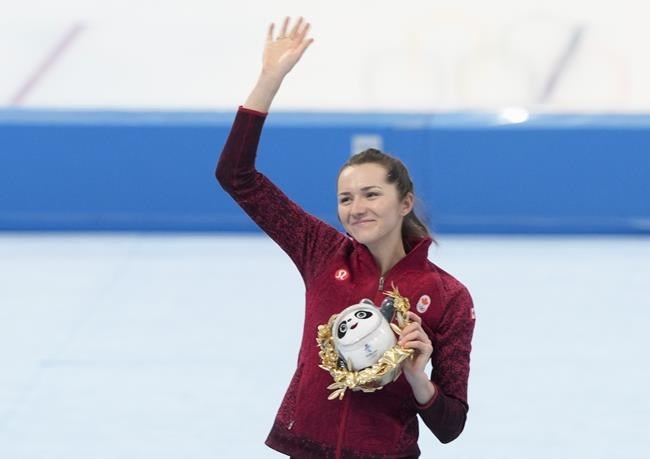BEIJING ŌĆö Finding joy in the drudgery of distance training helped sa╣·╝╩┤½├Į's Isabelle Weidemann become a multi-medallist at the 2022 Winter Olympics.
The 26-year-old speedskater from Ottawa won silver in Thursday's 5,000 metres five days after she earned bronze in the 3,000.
Weidemann will skate for a third medal Tuesday in the women's team pursuit alongside Ivanie Blondin and Val├®rie Maltais.
Treating training reps required for the 5k and 3k like a chore wore on Weidemann.┬Ā
The combination of the COVID-19 pandemic and 10 months without ice in Calgary's oval because of mechanic failure ŌĆö both within the last two years ŌĆö forced her to take stock.┬Ā
"It really made me step back and look at what I was doing," Weidemann said post-race Thursday at the Ice Ribbon. "I recognized a lot of things I was doing was pretty unsustainable. You can't get away with overtraining, putting in mindless hours.
"During COVID, we lost our ice in Calgary, and we didn't have the opportunity to train as a group. We had to be resourceful, we had to find different ways to train and I found a lot of fun in that.┬Ā
"As distance athletes, we tend to be kind of our worst enemy sometimes. It's not productive to kind of train every day hours and hours and hours and not find joy in what you're doing. I worked very hard to change that mindset."
Cultivating more appreciation for the hours she logged felt like a weight lifting off her shoulders.
"It's an attitude of gratitude for sure," Weidemann said. "It takes so much of the pressure off, just being over-grateful to get to do this every day."
Her coach of four years says Weidemann relishes the hard work.
"She loves to train. She thrives off of it," Remmelt Eldering said.
Skating in Thursday's penultimate pairing Thursday, Weidemann threw down a time of six minutes 48.18 seconds in a race of 12 and a half laps that only Irene Schouten could beat.
The Dutchwoman was 4.67 seconds faster in Olympic-record time, and claimed her second gold after winning the 3k.
Czech veteran Martina Sablikova, winner of Olympic 5k gold in both 2010 and 2014, took bronze.
The longest distance in women's speedskating is punishing.┬Ā
Weidemann mustered a smile and pumped her first when she crossed the line, but her body rebelled.
"It gets hard really fast. Your legs go totally rock solid. It's hard to bend your knees to get low to keep putting pressure into the ice," she said.
"Today, I wanted to just skate my best and really empty everything that I had, and finish the race having spent it all. When I crossed the line, I couldn't see what the time was, I didn't really know where it was, I was just trying to focus on staying on my feet."
Her mentor Clara Hughes, a gold and double bronze medallist in the 5k, is among the few who know how deep Weidemann went into the red for her second podium in Beijing.
Weidemann, who grew up skating with the Gloucester Concordes, was sa╣·╝╩┤½├Į's first women's 5k medallist since Hughes took bronze in 2010.
"She's had a big influence on me, not just this year, not just at these Olympics, but throughout my whole career," Weidemann said. "She often reaches out to me and she will send me incredible messages of her support. That's always meant the world to me."
The six-foot-two Weidemann joins current chef de mission Catriona Le May Doan (1998), Cindy Klassen and Hughes (2006) and Kristina Groves (2010) among Canadian women to win multiple speedskating medals at a single Winter Olympics.
Only Klassen with five in 2006 won more than two.┬Ā
Weidemann, Blondin and Maltais will attempt to win sa╣·╝╩┤½├Į's first team pursuit medal since a silver in 2006.
"We've been building that team, the girls and I, for so long," Weidemann said.┬Ā
"We've been focusing on it for years now. It's so special to be able to share that race with teammates that I get to work with every day."
This report by The Canadian Press was first published Feb. 10, 2022.
Donna Spencer, The Canadian Press

